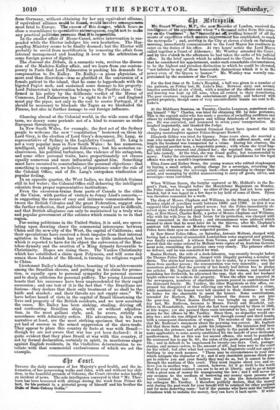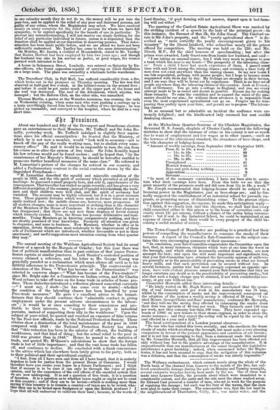'64t aittrufulby.
StuartWettley, M.P., the new Recorder of London, received the intelligence of l appointment when "a thousand miles from this coun- try es: the Cent/ma ' • he " instantly set off, availing himself of all the means of expeffition which modein improvement has established, to reach the metropolis ' ; and, arriving in the City at eleven o'clock on Saturday morning, immediately communicated to the Lord Mayor his readiness to enter on the duties of his office. At two hours' notice the Lord Mayor called together a Court of Aldermen ; Mr. Wortley attended the Court ; and by two o'clock in the afternoon he had taken the oaths of his judicial office. In the brief speech which he addressed to the Court, he declared that he considered his appointment, under such remarkable circumstances, to be the highest and proudest distinction to which he could be elevated, "not inferior to any of those honourable distinctions which it is in the power even of the Queen to bestow." Mr. Wortley was warmly con- gratulated by the members of the Court
For the first time at St. Luke's Hospital, a ball was given to a number of the patients, on Friday. last, St. Luke's Day. Between sixty and seventy lunatics assembled at six o'clock, with a number of the officers and nurses, and dancing was kept up till nine, when all retired to their dormitories. The poor creatures enjoyed the entertainment greatly, and behaved with perfect propriety, though cases of very uncontrollable mania are sent to St. Luke's.
At the Middlesex Sessions, on Tuesday, Charles Longman, sometimes call- ing himself " Sir" Charles, was tried for obtaining 201. by false pretences. This is the roguish sailor who has made a practice of swindling outfitters and others by exhibiting forged papers and telling falsehoods of his services at sea. He was convicted, and sentenced to seven years' transportation. He laughed impudently, and thanked the Judge.
The Grand Jury at the Central Criminal Court have ignored the bill charging manslaughter against Police-Sergeant Bushell.
Elizabeth Gilday was tried for bigamy. Some years since, she married a man who turned out to be a bad character ; the wife suffered much, and at length the husband was transported for a crime. During his absence' the wife married another man, a respectable person ; with whom she lived hap. pily, till Gilday returned and claimed her ; sheruegulsed him, and he gave
her into custody. At the trial, she was found ty, but recommended to mercy. Under the circumstances of the case, e punishment for the legal offence was only a month's imprisonment.
Eliza Jones and Esther Stone, the young women who robbed shopkeepers by buying a small article, getting change for a sovereign, returning the article and obtaining the sovereign back—then pretending to change their mind, and managing by skilful maneuvering to carry off goods, silver, and sovereign—were convicted.
When William Dyson, the bmglar captured at Mr. Holforcl's in the Re- gent's Park, was brought before the Marylebone Magistrate on Monday, the Police asked for a remand : no other of the gang had yet been appre- hended, but it was hoped in a few days to lay hold of some of them. Dyson was therefore remanded for a week.
The shop of Messrs. Clapham and Williams, in the Strand, was robbed on Monday night of jewellery worth between 1600/. and 17001. At first it was supposed that burglars had gained access ; but the Police immediately ob- served signs which directed suspicions to an inmate of the house. Yester- day, at Bow Street, Charles Kelly, a porter of Messrs. Clapham and Williams, who with his wife lives in their house for its protection, was charged with being concerned in the robbery ; and circumstances were adduced which seemed to show that he must have let in the thieves, after Mr. Clapham's assistant left business on Monday evening. He was remanded, and the Police have their eyes on other suspected parties. At Bow Street Police Office, on Saturday, .Antonio Molteni, charged with having had a number of counterfeit Lombardi= notes engraved and printed, was finally examined. A witness from Verona, and another from Vienna, proved that the notes ordered by Molteni were copies of an Austrian Govern- ment note, resembling the genuine ones very closely. The prisoner offered no defence, and he was committed for trial.
Rosina Herbert, the wife of a dock-labourer, was recently brought before the Thames Police Magistrate, charged with illegally pawning a number of shirts. The shirts had been intrusted to her to make, by .a woman who had them from another person ; the remuneration was very miserable ; and the seamstress pleaded that the poverty of her family had driven her to pledge the articles. Mr. Ingham felt commiseration for the woman, and instead of punishing her forthwith, he adjourned the case, that she and her husband might endeavour to redeem the property. When the affair was reported in the newspapers, numbers of charitable persons poured in contributions for the distressed family. Mr. Yardley, the other Magistrate at this office,. ex- pressed his disapproval of thus relieving one who had committed a crime, while numbers of the honest were left unaided in their distress : it would be better for the charitable to assist the honest. Some contributions, intended for Herbert, Mr. Yardley induced the donors to put into the poor-box. When Rosins Herbert was brought up again on Fri- day last, Mr. Ruthven, foreman to Messrs. Favell and Benefield, out- fitters in Houndeditch, ;dated that she had been employed by them in 1849, at fair wages; yet she pawned three coats intrusted to her, and was sent to prison for the offence by Mr. Yardley. Since then, no slopseller would em- ploy her ; and she was obliged to take work through second and third hands, with a consequent diminution of wages. The minutes of the court showed that Mr. Ruthven's statement about the pawning was correct. Mr. Ingham felt that these facts ought to guide his judgment. His intention had been to caution the prisoner, and advise her to apply to the parish for relief, or to make application to some society established for the benefit of poor distressed needlewomen. But as this was her second offence, she must be punished. He sentenced her to pay 8s. 6d., the value of the goods pawned, and a fine of las.; and in default to be imprisoned for twenty-one days. Cash, postage- stamps, and money-orders, to the amount of 431., had been sent to the court for her relief; but after what had occurred, the Magistrate could not apply a farthing to any such purpose. "There may be circumstances in your ease which mitigate the character of it ; and if any charitable persons think pro- per to relieve you and your family they may do so, but it cannot be done through the medium of this court. They must inquire about you and re- lieveyou in another way. I cannot, however, let it go forth to the world that for your wicked conduct you are to be set at liberty, and to go at large with a great sum of money for transgressing the law ; and I will never on any occasion be the medium of bestowing any money upon persons who have violated the law. I believe that is also the determination of my colleague Mr. Yardley. I therefore publicly declare, that the money sent during the past week for your benefit will be retained for other purposes and for more deserving cases : but if the persons who have sent the various donations wish to reclaim the money, they can have it back again. If with- in one calendar month they do not do so, the money will be put into the poor-box, and be applied to the relief of any poor and distressed persons, not guilty of any crime, whom the Magistrates may select. We have received money on many occasions for the relief of persons for whom we have felt sympathy, to be applied specifically for the benefit of one in particular. To prevent any misunderstanding, I will not receive one single farthing for the relief of any particular individual in future, unless it is stipulated that the donation shall be applied at our discretion to deserving persons. That deter- mination has been made public before, and we are afraid we have not been sufficiently understood. Mr. Yardley has come to the same determination." On Monday, Mr. Jacobs, a clothier of Houndsditch, stated to Mr. Yardley that Rosins Herbert had been employed by him two years ago ; and though her husband was also in his service as porter, at good wages, the woman pawned work intrusted to her.
A house in Salamanca Street, Lambeth, was entered on Saturday by Ex- cise-officers, who found apparatus capable of carrying on illicit distillation on a large scale. The place was ostensibly a wholesale bottle-warehouse.
The Travellers' Club, in Pall Mall, has suffered considerably from a fire, which broke out in the premises on Thursday morning. The fire was first observed at half-past five o'clock, in the billiard-room on the second floor ; and before it could be got under much of the upper part of the house and the roof was destroyed. The roof of the Athenaeum, which adjoins, was damaged ; but the Reform Club, on the other side, was unscathed.
Thomas Martin, a porter at the Waterloo terminus, was crossing the rails on Wednesday evening, when some men who were pushing a carriage up to a train unwittingly forced him between the buffers of two carriages : he was picked up insensible, and conveyed to the hospital, where he died in a very short time.



























 Previous page
Previous page